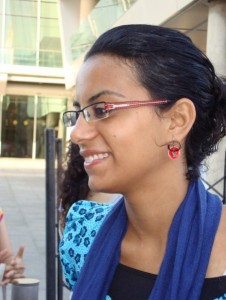
(Photo courtesy of Maheinour El Masry Facebook Page)
Prosecution ordered the release of Alexandrian activist and lawyer Mahienour El-Massry on Saturday after she contested a verdict in absentia against her. A date for El-Massry’s first trial session was set for 20 May.
El-Massry was arrested on Friday night in the Mansheya neighbourhood in Alexandria, and was taken to the Mansheya police station by an officer called Tamer Moein who knew her from a previous case, said Ahmed El-Shazly, the regional director of the Egyptian Initiative for Personal Rights (EIPR).
El-Massry was sentenced in absentia for two years and EGP 50,000 fine for violating the Protest Law by organising a protest in solidarity with Khalid Said during the retrial of the police personnel accused of his murder last December.
Moein arrested El-Massry to face the verdict and also accused her of “intentionally hiding documents”, El-Shazly said. After investigation, however, the prosecution dismissed the new accusation against El-Massry because the documents were just letters from four of the detainees in the same case where El-Massry was sentenced in absentia and were insignificant to the case.
Said’s torture and death in 2010 played a major part in inciting the 25 January Revolution. The Alexandria Criminal court convicted two of the three personnel charged in his torture and murder, sentencing them to serve 10 years in maximum security prison. The third was acquitted.
On 2 December, clashes erupted outside the courthouse where the retrial of Khalid Said’s accused killers was in session. Clashes between protesters and masked police officers resulted in the arrest of three protesters. Last February four of the accused got their verdict upheld while five others, including El-Massry and activist Hassan Mustafa, were tried in absentia.
Taher Mukhtar, a member of the activist group Revolutionary Socialists in Alexandria, who was among the protesters on 2 December, said he was assaulted by security forces and that two of the protesters who were arrested on that day were trying to get the police officer who was assaulting him to stop.
Mukhtar said he tried to testify in front of the prosecution as a witness and as a victim but his request was denied. In court, he was stalled several times until the verdict was issued.
Mukhtar filed a complaint on 5 December against the prosecutor who barred him from testifying, but his complaint was never reviewed.
“I feel helpless because I cannot help the people who defended me,” Mukhtar said. “I can obviously tell that the prosecution and the judiciary are involved in the conspiracy against the revolutionaries and anyone who wants to make a positive change.”
